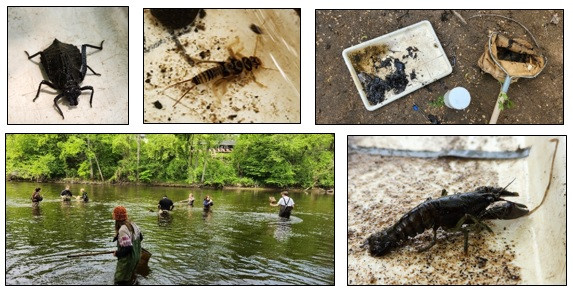Students Involved in Stream Biological Monitoring
Each season, local high school students venture to a nearby river or stream, grab a dip net and pair of waders, and search for invertebrates (a mix of aquatic insects, crustaceans, bugs, snails, worms, and other critters lacking a backbone) living amongst the submerged rocks and vegetation. They bring their catch back to their partners on shore, who use guides to identify the invertebrates or preserve them for identification at a later date in the lab. In 2023, ACD staff led 560 high school students across 20 classes and 5 schools in these "biomonitoring" efforts. Besides being a great way to get some fresh air, students learned valuable lessons in aquatic ecology.
Individual aquatic invertebrates have different sensitivities to environmental disturbances such as contamination and habitat loss. Some, such as stonefly and mayfly nymphs, often have a strong negative reaction to disturbance, while others, such as leeches, midges, and aquatic worms, are usually more tolerant and able to persist through a variety of conditions. Understanding these tolerance thresholds across species is an efficient way to broadly assess the health of a waterbody. For example, a high quantity and/ or diversity of species including those considered "intolerant" (sensitive) is a likely indicator of healthy habitat and water quality, whereas the presence of only more "tolerant" species hints at poorer water quality and habitat. Biomonitoring data is often paired with other information, such as water quality or stream morphology data, to identify where aquatic impairments are present and management efforts should be pursued.
After the students have finished collecting and processing samples, ACD staff re-identifies them and summarizes the data in the annual Water Almanac. Through this, big-picture trends in invertebrate communities (and stream health, by extension) can be explored across time. For more information contact Breanna Keith, Water Resource Technician, at
When you subscribe to the blog, we will send you an e-mail when there are new updates on the site so you wouldn't miss them.
